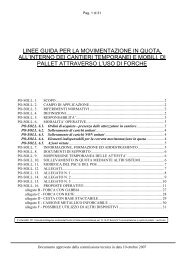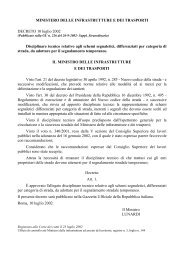- Page 1:
RICONQUISTARE IL PAESAGGIO La Conve
- Page 5 and 6:
A cura di: Corrado Teofili e Rosa C
- Page 8 and 9:
Sommario Presentazione, di Enzo Ven
- Page 10 and 11:
Presentazione di Enzo Venini Presid
- Page 12:
Riconquistare il paesaggio diversi
- Page 15 and 16:
14 NOTA DEI CURATORI gi uno dei pi
- Page 17 and 18:
16 NOTA DEI CURATORI mente in “se
- Page 19 and 20:
18 INTRODUZIONE Ma ora, all’inizi
- Page 21 and 22:
20 INTRODUZIONE I tecnici dell’Is
- Page 23 and 24:
22 INTRODUZIONE delle falesie a str
- Page 25 and 26:
24 INTRODUZIONE tro di ricerche eco
- Page 27 and 28:
26 INTRODUZIONE Bibliografia Gianfr
- Page 29 and 30:
28 CAPITOLO 1 - La Convenzione Euro
- Page 31 and 32:
30 CAPITOLO 1 - La Convenzione Euro
- Page 33 and 34:
32 CAPITOLO 1 - La Convenzione Euro
- Page 35 and 36:
34 CAPITOLO 1 - La Convenzione Euro
- Page 37 and 38:
36 CAPITOLO 1 - La Convenzione Euro
- Page 39 and 40:
38 CAPITOLO 1 - La Convenzione Euro
- Page 41 and 42:
40 CAPITOLO 1 - La Convenzione Euro
- Page 43 and 44:
42 CAPITOLO 1 - La Convenzione Euro
- Page 45 and 46:
44 CAPITOLO 1 - La Convenzione Euro
- Page 47 and 48:
46 CAPITOLO 1 - La Convenzione Euro
- Page 49 and 50:
48 CAPITOLO 1 - La Convenzione Euro
- Page 51 and 52:
50 CAPITOLO 1 - La Convenzione Euro
- Page 53 and 54:
52 CAPITOLO 1 - La Convenzione Euro
- Page 55 and 56:
54 CAPITOLO 1 - La Convenzione Euro
- Page 57 and 58:
56 CAPITOLO 1 - La Convenzione Euro
- Page 59 and 60:
58 CAPITOLO 1 - La Convenzione Euro
- Page 61 and 62:
60 CAPITOLO 1 - La Convenzione Euro
- Page 63 and 64:
62 CAPITOLO 1 - La Convenzione Euro
- Page 65 and 66:
64 CAPITOLO 1 - La Convenzione Euro
- Page 67 and 68:
66 CAPITOLO 1 - La Convenzione Euro
- Page 69 and 70:
68 CAPITOLO 1 - La Convenzione Euro
- Page 71 and 72:
70 CAPITOLO 1 - La Convenzione Euro
- Page 73 and 74:
72 CAPITOLO 1 - La Convenzione Euro
- Page 75 and 76:
74 CAPITOLO 1 - La Convenzione Euro
- Page 77 and 78:
76 CAPITOLO 1 - La Convenzione Euro
- Page 79 and 80:
78 CAPITOLO 1 - La Convenzione Euro
- Page 81 and 82:
80 CAPITOLO 1 - La Convenzione Euro
- Page 83 and 84:
82 CAPITOLO 1 - La Convenzione Euro
- Page 85 and 86:
84 CAPITOLO 1 - La Convenzione Euro
- Page 87 and 88:
86 CAPITOLO 1 - La Convenzione Euro
- Page 89 and 90: 88 CAPITOLO 1 - La Convenzione Euro
- Page 91 and 92: 90 CAPITOLO 1 - La Convenzione Euro
- Page 93 and 94: 92 CAPITOLO 1 - La Convenzione Euro
- Page 95 and 96: 94 CAPITOLO 1 - La Convenzione Euro
- Page 97 and 98: 96 CAPITOLO 1 - La Convenzione Euro
- Page 99 and 100: 98 CAPITOLO 1 - La Convenzione Euro
- Page 101 and 102: 100 CAPITOLO 1 - La Convenzione Eur
- Page 103 and 104: 102 CAPITOLO 1 - La Convenzione Eur
- Page 105 and 106: 104 CAPITOLO 1 - La Convenzione Eur
- Page 107 and 108: 106
- Page 109 and 110: 108 CAPITOLO I1 - La percezione del
- Page 111 and 112: 110 CAPITOLO I1 - La percezione del
- Page 113 and 114: 112 CAPITOLO I1 - La percezione del
- Page 115 and 116: 114 CAPITOLO I1 - La percezione del
- Page 117 and 118: 116 CAPITOLO I1 - La percezione del
- Page 119 and 120: 118 CAPITOLO I1 - La percezione del
- Page 121 and 122: 120 CAPITOLO I1 - La percezione del
- Page 123 and 124: 122 CAPITOLO I1 - La percezione del
- Page 125 and 126: 124 CAPITOLO I1 - La percezione del
- Page 127 and 128: 126 CAPITOLO I1 - La percezione del
- Page 129 and 130: 128 CAPITOLO I1 - La percezione del
- Page 131 and 132: 130 CAPITOLO I1 - La percezione del
- Page 133 and 134: 132 CAPITOLO I1 - La percezione del
- Page 135 and 136: 134 CAPITOLO I1 - La percezione del
- Page 137 and 138: 136 CAPITOLO I1 - La percezione del
- Page 139: 138 CAPITOLO I1 - La percezione del
- Page 143 and 144: 142 CAPITOLO I1 - La percezione del
- Page 145 and 146: 144 CAPITOLO I1 - La percezione del
- Page 147 and 148: 146 CAPITOLO I1 - La percezione del
- Page 149 and 150: 148 CAPITOLO I1 - La percezione del
- Page 151 and 152: 150 CAPITOLO I1 - La percezione del
- Page 153 and 154: 152 CAPITOLO III - Paesaggi d’Ita
- Page 155 and 156: 154 CAPITOLO III - Paesaggi d’Ita
- Page 157 and 158: 156 CAPITOLO III - Paesaggi d’Ita
- Page 159 and 160: 158 CAPITOLO III - Paesaggi d’Ita
- Page 161 and 162: 160 CAPITOLO III - Paesaggi d’Ita
- Page 163 and 164: 162 CAPITOLO III - Paesaggi d’Ita
- Page 165 and 166: 164 CAPITOLO III - Paesaggi d’Ita
- Page 167 and 168: 166 CAPITOLO III - Paesaggi d’Ita
- Page 169 and 170: 168 CAPITOLO III - Paesaggi d’Ita
- Page 171 and 172: 170 CAPITOLO III - Paesaggi d’Ita
- Page 173 and 174: 172 CAPITOLO III - Paesaggi d’Ita
- Page 175 and 176: 174 CAPITOLO III - Paesaggi d’Ita
- Page 177 and 178: 176 CAPITOLO III - Paesaggi d’Ita
- Page 179 and 180: 178 CAPITOLO III - Paesaggi d’Ita
- Page 181 and 182: 180 CAPITOLO III - Paesaggi d’Ita
- Page 183 and 184: 182 CAPITOLO III - Paesaggi d’Ita
- Page 185 and 186: 184 CAPITOLO III - Paesaggi d’Ita
- Page 187 and 188: 186 CAPITOLO III - Paesaggi d’Ita
- Page 189 and 190: 188 CAPITOLO III - Paesaggi d’Ita
- Page 191 and 192:
1 190 CAPITOLO III - Paesaggi d’I
- Page 193 and 194:
192 CAPITOLO III - Paesaggi d’Ita
- Page 195 and 196:
194 5 CAPITOLO III - Paesaggi d’I
- Page 197 and 198:
196 CAPITOLO III - Paesaggi d’Ita
- Page 199 and 200:
198 CAPITOLO III - Paesaggi d’Ita
- Page 201 and 202:
200 CAPITOLO III - Paesaggi d’Ita
- Page 203 and 204:
202 CAPITOLO III - Paesaggi d’Ita
- Page 205 and 206:
204 CAPITOLO III - Paesaggi d’Ita
- Page 207 and 208:
206 CAPITOLO III - Paesaggi d’Ita
- Page 209 and 210:
208 CAPITOLO III - Paesaggi d’Ita
- Page 211 and 212:
210 CAPITOLO III - Paesaggi d’Ita
- Page 213 and 214:
212 CAPITOLO III - Paesaggi d’Ita
- Page 215 and 216:
214 CAPITOLO III - Paesaggi d’Ita
- Page 217 and 218:
216 CAPITOLO III - Paesaggi d’Ita
- Page 219 and 220:
218
- Page 221 and 222:
220 CAPITOLO IV - Paesaggio, territ
- Page 223 and 224:
222 CAPITOLO IV - Paesaggio, territ
- Page 225 and 226:
224 CAPITOLO IV - Paesaggio, territ
- Page 227 and 228:
226 CAPITOLO IV - Paesaggio, territ
- Page 229 and 230:
228 CAPITOLO IV - Paesaggio, territ
- Page 231 and 232:
230 CAPITOLO IV - Paesaggio, territ
- Page 233 and 234:
232 CAPITOLO IV - Paesaggio, territ
- Page 235 and 236:
234 CAPITOLO IV - Paesaggio, territ
- Page 237 and 238:
236 CAPITOLO IV - Paesaggio, territ
- Page 239 and 240:
238 CAPITOLO IV - Paesaggio, territ
- Page 241 and 242:
240 CAPITOLO IV - Paesaggio, territ
- Page 243 and 244:
242 CAPITOLO IV - Paesaggio, territ
- Page 245 and 246:
244 CAPITOLO IV - Paesaggio, territ
- Page 247 and 248:
246 CAPITOLO IV - Paesaggio, territ
- Page 249 and 250:
248 CAPITOLO IV - Paesaggio, territ
- Page 251 and 252:
250 CAPITOLO IV - Paesaggio, territ
- Page 253 and 254:
252 CAPITOLO IV - Paesaggio, territ
- Page 255 and 256:
254 CAPITOLO IV - Paesaggio, territ
- Page 257 and 258:
256 CAPITOLO IV - Paesaggio, territ
- Page 259 and 260:
258 CAPITOLO IV - Paesaggio, territ
- Page 261 and 262:
260 CAPITOLO IV - Paesaggio, territ
- Page 263 and 264:
262 CAPITOLO IV - Paesaggio, territ
- Page 265 and 266:
264 CAPITOLO IV - Paesaggio, territ
- Page 267 and 268:
266 CAPITOLO IV - Paesaggio, territ
- Page 269 and 270:
268 CAPITOLO IV - Paesaggio, territ
- Page 271 and 272:
270 CAPITOLO IV - Paesaggio, territ
- Page 273 and 274:
272 CAPITOLO IV - Paesaggio, territ
- Page 275 and 276:
274 CAPITOLO IV - Paesaggio, territ
- Page 277 and 278:
276 CAPITOLO IV - Paesaggio, territ
- Page 279 and 280:
278 CAPITOLO IV - Paesaggio, territ
- Page 281 and 282:
280 CAPITOLO IV - Paesaggio, territ
- Page 283 and 284:
282 CAPITOLO IV - Paesaggio, territ
- Page 285 and 286:
284 CAPITOLO IV - Paesaggio, territ
- Page 287 and 288:
286 CAPITOLO IV - Paesaggio, territ
- Page 289 and 290:
288 CAPITOLO IV - Paesaggio, territ
- Page 291 and 292:
290 CAPITOLO IV - Paesaggio, territ
- Page 293 and 294:
292 CAPITOLO IV - Paesaggio, territ
- Page 295 and 296:
294 CAPITOLO IV - Paesaggio, territ
- Page 297 and 298:
296 CAPITOLO IV - Paesaggio, territ
- Page 299 and 300:
298 CAPITOLOV - Paesaggi e partecip
- Page 301 and 302:
300 CAPITOLOV - Paesaggi e partecip
- Page 303 and 304:
302 CAPITOLOV - Paesaggi e partecip
- Page 305 and 306:
304 CAPITOLOV - Paesaggi e partecip
- Page 307 and 308:
306 CAPITOLOV - Paesaggi e partecip
- Page 309 and 310:
308 CAPITOLOV - Paesaggi e partecip
- Page 311 and 312:
310 CAPITOLOV - Paesaggi e partecip
- Page 313 and 314:
312 CAPITOLOV - Paesaggi e partecip
- Page 315 and 316:
314 CAPITOLOV - Paesaggi e partecip
- Page 317 and 318:
316 CAPITOLOV - Paesaggi e partecip
- Page 319 and 320:
318 CAPITOLOV - Paesaggi e partecip
- Page 321 and 322:
320 CAPITOLOV - Paesaggi e partecip
- Page 323 and 324:
322 CAPITOLOV - Paesaggi e partecip
- Page 325 and 326:
324 CAPITOLOV - Paesaggi e partecip
- Page 327 and 328:
326 CAPITOLOV - Paesaggi e partecip
- Page 329 and 330:
328 CAPITOLOV - Paesaggi e partecip
- Page 331 and 332:
330 CAPITOLOV - Paesaggi e partecip
- Page 333 and 334:
332 CAPITOLOV - Paesaggi e partecip
- Page 335 and 336:
334 CAPITOLOV - Paesaggi e partecip
- Page 337 and 338:
336 CAPITOLOV - Paesaggi e partecip
- Page 339 and 340:
338 CAPITOLOV - Paesaggi e partecip
- Page 341 and 342:
340 CAPITOLOV - Paesaggi e partecip
- Page 343 and 344:
342 CAPITOLOV - Paesaggi e partecip
- Page 345 and 346:
344 CAPITOLOV - Paesaggi e partecip
- Page 347 and 348:
346 CAPITOLOV - Paesaggi e partecip
- Page 349 and 350:
348 CAPITOLOV - Paesaggi e partecip
- Page 351 and 352:
350 CAPITOLOV - Paesaggi e partecip
- Page 353 and 354:
352 CAPITOLOV - Paesaggi e partecip
- Page 355 and 356:
354 CAPITOLOV - Paesaggi e partecip
- Page 357 and 358:
356 CAPITOLOV - Paesaggi e partecip
- Page 359 and 360:
358 CAPITOLOV - Paesaggi e partecip
- Page 361 and 362:
360 CAPITOLOV - Paesaggi e partecip
- Page 363 and 364:
362 CAPITOLOV - Paesaggi e partecip
- Page 365 and 366:
364 CAPITOLOV - Paesaggi e partecip
- Page 367 and 368:
366 Makhzoumi, J. and Pungetti G.,
- Page 370:
La Convenzione Europea sul Paesaggi





